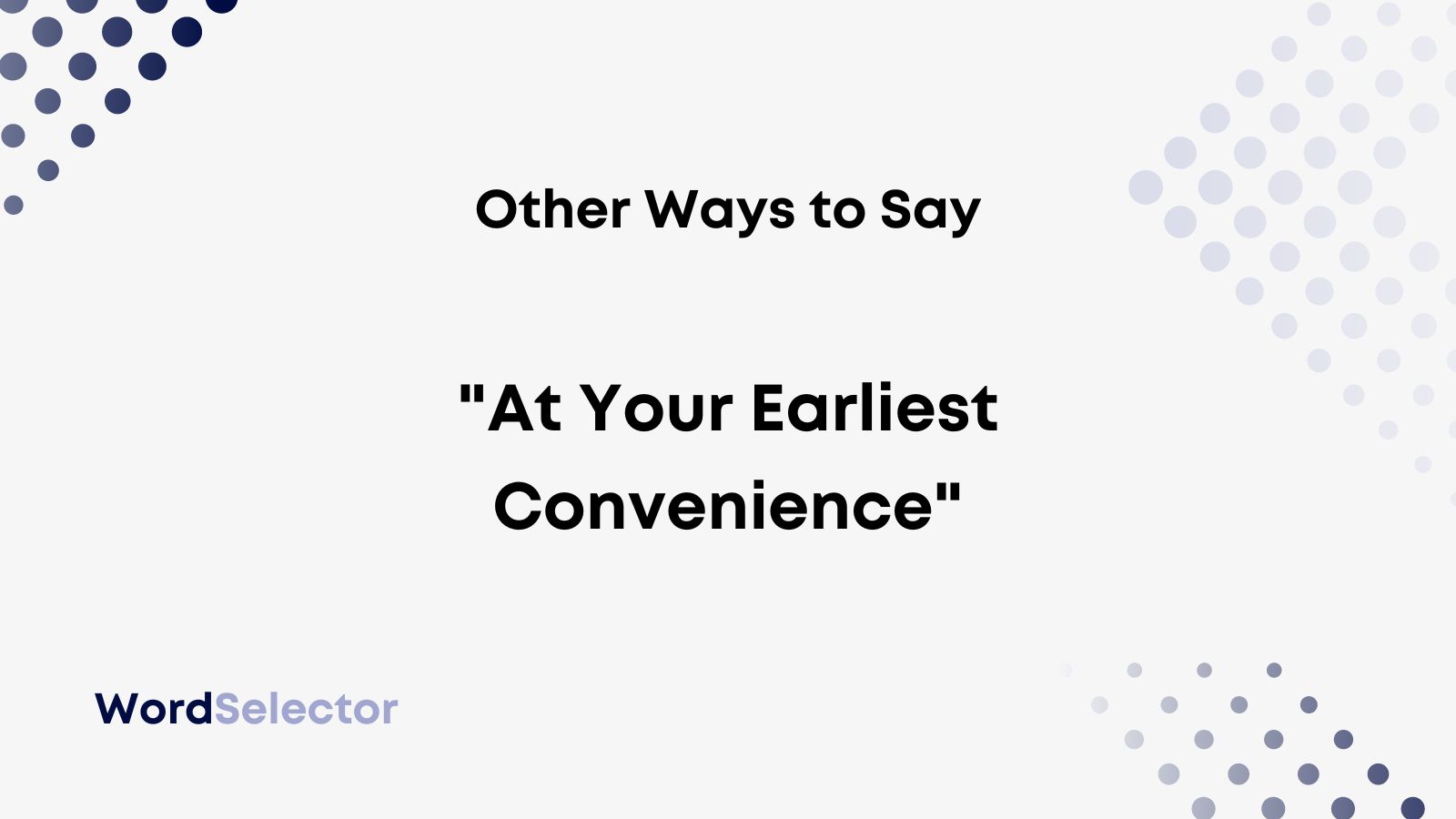Is “at your earliest convenience” the best way to ask someone to do something quickly? Well, that’s certainly a question that’s worth answering.
Luckily, you’re in the right place. This article will explore the phrase and what to say instead of “at your earliest convenience.”
Other Ways to Say “At Your Earliest Convenience”
- When it suits you
- Whenever works
- When you can
- If you get a minute
- Whenever you get the chance
- As soon as possible
- As soon as you can
- As and when you can
- Soon
- Sharpish
- When you have the time
- If you have the time
- When you make time
- As early as possible
- As quickly as you can
KEY TAKEAWAYS
- “At your earliest convenience” is polite and formal when asking someone to do something soon.
- You should try “when it suits you” in business contexts to give you something different to say.
- “Whenever works” is a conversational alternative that works well when chatting with friends.
It would help to learn some formal and informal synonyms for “at your earliest convenience.” Keep reading if you want to find out the best options for both tones.
Also, you should go to the final section to learn whether it’s polite. That way, you’ll better understand when you can write it yourself.
When It Suits You (Formal)
“When it suits you” is an excellent formal synonym for “at your earliest convenience.” You should use it to find out what time suits someone before asking them to do a task.
It’s very common to use this phrase when you want to be respectful of authority. It’s not as demanding as “at your earliest convenience.” This makes it acceptable in formal contexts when you ask your boss for help rather than coworkers.
“At your earliest convenience” is more suitable in formal cases when you are asking a subordinate to do something. It shows you have authority over them. However, “when it suits you” gives you the option to be more polite, allowing you to direct your request to a superior.
Here are some examples to show you when you might use it in formal English:
I’m going to need this task done when it suits you. I would like you to try your best to get it done quickly.
Sorry, but when it suits you, could you do this, please? I think you’re the only person who can help.
Whenever Works (Informal)
“Whenever works” might seem blasé, but it’s a surprisingly effective informal way to say “at your earliest convenience.” It takes a lot of pressure out of the formal phrase.
You can use “whenever works” as it suggests that you don’t have a specific time in mind for someone to complete a task. It leaves it up to them to determine when they want to help you.
“Whenever” is best to use when speaking with friends or asking them to do something that might benefit you.
We do not encourage using “whenever works” professionally. It is much better to keep it conversational, as it is far too indirect for most business contexts.
Check out these examples to see how you might use it:
I’m easy! I’d love your help with this stuff. Whenever works for you, though.
I’d like to get you to come along whenever works. I think you’ll help us out here.
Is It Polite to Say “At Your Earliest Convenience”?
As a phrase on its own, “at your earliest convenience” is polite. You can use it in business contexts to request someone’s attention or help quickly.
However, if you add extra fluff to “at your earliest convenience,” you risk sounding impolite. For example:
- Get this work done for me at your earliest convenience.
The more demanding the sentence, the less polite the phrase becomes. You should try to keep the words in the sentence to a minimum.
Though, if you plan on using more words, you might want to think about some of the following:
- Please respond at your earliest convenience
- Call me at your earliest convenience
- Remit payment at your earliest convenience
- Please do the needful at your earliest convenience
Writing “please” before most sentences with “at your earliest convenience” is a good way to keep it polite. It shows that you want someone to help you, but using “please” shows that you appreciate you’re asking a lot of them.
To sum up, “at your earliest convenience” is not rude. It works well in formal contexts, though you should watch how you deliver the sentence. It’s easy to turn into a rude phrase if you don’t include polite and positive words like “please.”
Perhaps you should bookmark this page if you worry that you haven’t figured it out. That way, you can always come back to it and learn more!

